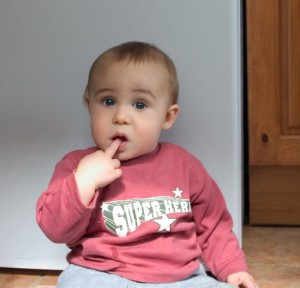Transnational Raunchiness
04/14/09
Some times one can find huge coincidences and similarities between otherwise very different cultures and languages.
Take for example, the oh-so delightful phenomenon where kids who are learning to speak, pronounce words in ways that make them sounds like profanity. You know, your beautiful child’s mouth innocently (and unwittingly) emitting R-rated epithets, much to the delight of your juvenile friends and YouTube followers.
But what is really mind-blowing to me is that such tricky words or concepts be the same in two very different languages.
For a couple of days now, I’ve been working with my automotively-obsesed boy to get him to learn the Spanish word for “truck”, which is “camión”. Maybe you see where I’m going with this: Many toddlers seem to have trouble with the word “truck” and end up pronouncing in a way that makes it sound like the infamous f-word. [CASE IN POINT – click here].
Well, my child’s pronunciation of the word “truck” is Shakespeareanly flawless. But wouldn’t you know it? Its Spanish equivalent, “camión”, when pronounced by my boy, sounds like “cabrón” (with apologies to my Spanish-speaking readers), which means something a bit more egregious than “a-hole”.
How is that for an argument for equality of all races and nationalities?



Hi Ruben, just wanted to give you a shout out and tell you how much I’m enjoying the blog. It’s quite good reading. And an extra plus: I get to learn or re-learn some Spanish words! Like camion! And cabron too, but I don’t think I’ll be using that one if I can help it.
dave gels
fellow powderhornian parent
Ruben, Cute essay!!! B.